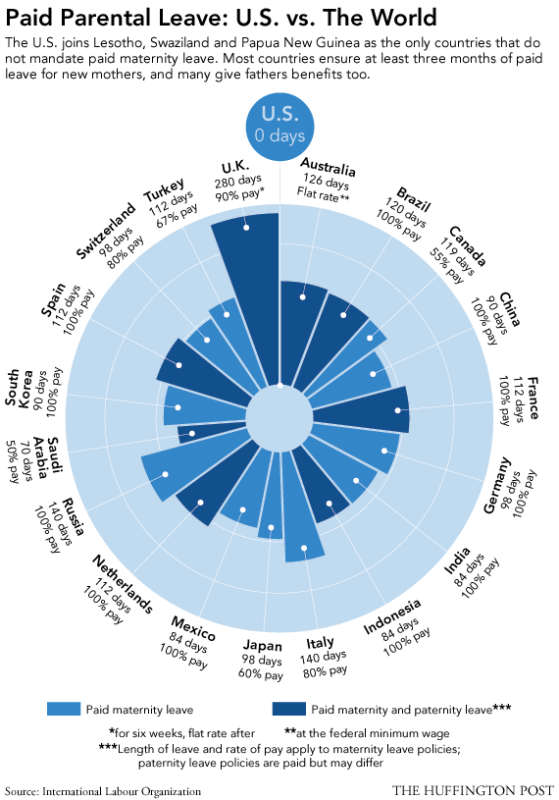Mention state funds to provide wage replacement during a family leave and most people think of states on one or the other coasts. But campaigns for family and medical leave insurance funds are moving to the heartland.
Recently I was honored to speak at a program on paid family leave sponsored by a diverse group of Nebraska organizations: Voices for Children, Coalition for a Strong Nebraska, Nebraska AARP, Nebraska Appleseed and Holland Children’s Movement. The organizers wanted me to describe my journey to this issue after having my two kids without any paid leave and what lessons I’ve learned along the way.
I talked about the long fight for the Family and Medical Leave Act, a crucial first step that protects many Americans’ jobs if they need to take leave from work to recover from surgery or illness or care for a new baby or ill family member. But what was major progress in 1993 still leaves out 40 percent of the workforce, does not cover most routine illness or preventive care, and is unpaid. I shared my experiences on the bipartisan Congressional Commission on Leave in 1995, which, despite deep disagreements, unanimously encouraged states to experiment with forms of wage replacement during leave. This breakthrough came after learning how many leave-takers are forced onto public assistance – nearly one in ten (9 percent) back in 1995. In 2012, that percentage had gone up (9.8 percent). So did the number of people who are eligible for leave and need it but don’t take the time, mostly because they can’t afford it.
“This is a jobs and economy issue as well as a health and family issue,” I said. I shared the good news from states that have already established family and medical leave funds and the knowledge that these wins are paving the way for a national standard.
“The World Stands Still But the Bills Keep Coming In”
The audience also heard from a terrific panel that included Angie Gross, an insurance worker who described the ordeal of having a six-year-old struck by meningitis who had to learn to walk and talk all over again. That meant a long slog at a rehabilitation center in another city. Angie and her husband couldn’t afford unpaid leave, she said, “but it wasn’t an option to leave our daughter there alone.” Alluding to the extra travel expenses and the difficult choices of which bills to pay, Angie summed up the reality for those dealing with the serious illness of a loved one: “The world stands still, but the bills keep coming in.”
Business owner Craig Moody sat at the speakers table with his cell phone in front of him, in case his very pregnant wife called to announce that she had gone into labor. “It’s important that everyone is focused on the job to do their best work,” he said, “but work is not the most important thing in their lives.” For him and his business partner, genuine flexibility is a core principle. They involve their staff in writing the policies, understanding that employees have a stake in the business’s success and that attracting and retaining “excited and engaged employees” is what drives that success.
Craig Moody already provides paid leave for his employees, but he also knows the value of a program that will make this possible for Angie Gross and everyone else as well – for those times we all face “when life comes up.”
Traci Penrod-McCormack, a clinical therapist whose expertise is infant mental health and parent/child attachment, helped us see how children develop a sense of self. The more they experience a loving, nurturing and consistent response to their signals, the more they develop a sense of adequacy. For this to happen, parents need affordable time with new babies in those critical first few months.
The final panelist was State Sen. Sue Crawford, who plans next session to introduce legislation for a statewide family and medical leave insurance fund. Sec. Crawford is also a faculty member at Creighton University and talked about the outrage her students experience when they first learn what an outlier the U.S. is compared to the rest of the world on family leave. As a political scientist, she’s aware of the growing body of evidence showing employer support for the funds after they’re implemented. The research also shows the positive impact of paid family leave on child well-being, on employee morale, and on women’s ability to stay employed and experience a decline in the wage gap.
Afterward, audience members came up to me to share their own stories. One AARP volunteer told me that when her son was dying, his wife could not afford to be at his side during working hours. They all agreed with Angie Gross: “Paid … leave would make a huge difference to those families who are really trying to do the right thing.”
